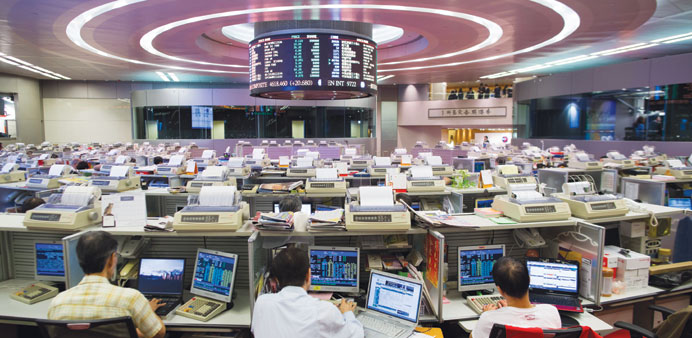Investors are favouring Hong Kong Exchanges, the world’s third-largest bourse operator by market value, as other touted winners from the link including casino stocks drop
Bloomberg
Sydney
A plan to link equity markets in Hong Kong and Shanghai is pushing bullish wagers on Hong Kong Exchanges and Clearing shares to a three-year high.
With 23.5bn yuan ($3.8bn) of daily trading via the tie-up expected to be allowed starting in October, the Hong Kong’s bourse’s revenue will swell on the extra volume, according to BNP Paribas SA.
The prospect of the link being expanded to other exchange-traded assets is set to boost profits even more, said Daiwa Securities Group. The cost of bullish bets in the options market is near the highest since 2011 relative to bearish ones, data compiled by Bloomberg on six- month contracts show. The shares advanced 12% this year.
Investors are favouring Hong Kong Exchanges, the world’s third-largest bourse operator by market value, as other touted winners from the link including casino stocks drop.
The through train, as the deal is known, will open up the mainland market to foreign investors while giving wealthy Chinese investors a route to buy Hong Kong stocks.
“Hong Kong Exchanges is a direct listed beneficiary for the through train,” said Anthony Wong, a Hong Kong-based equity derivatives strategist at BNP Paribas. “Investors can consider monetizing the attractive upside skew.”
Calls betting on a 10% gain in Hong Kong Exchanges shares cost 2.8 points more than puts betting on a similar-sized drop yesterday, data compiled by Bloomberg on six-month contracts show. The difference touched 5.7 points on June 13, the most since February 2011.
The through train will boost the average daily value of trading on Hong Kong Exchanges to HK$93bn ($12bn), according to forecasts by BNP Paribas. That would be a 43% increase from the bourse’s average in the first five months of the year, data compiled by Bloomberg show. Scott Sapp, a Hong Kong-based spokesman for the bourse, declined to comment on options trading in his firm’s shares.
The HSI Volatility Index, which tracks the cost of options on Hong Kong’s Hang Seng Index, slid 3.8% to 12.73 in the city, the lowest in more than a year. Hong Kong Exchanges shares declined 1.1% to HK$145.40. The Chicago Board Options Exchange Volatility Index, or the VIX, advanced 3.9% to 12.65 yesterday.
China’s Premier Li Keqiang has said the link between the Hong Kong bourse and Shanghai Stock Exchange will lead to deeper integration with international markets as the nation loosens capital controls in a bid to claim a greater role for the yuan in global trade.
“The Shanghai-Hong Kong Connect’s importance extends beyond an immediate uplift to average daily turnover and will have major implications for Hong Kong Exchanges,” said Jonas Kan, a Hong Kong-based analyst at Daiwa. “It is likely to extend beyond equity investments, to commodities, forex and other asset classes over time.”
The deal furthers China’s push to reduce capital controls after policy makers pledged the biggest expansion of economic freedoms since the 1990s and widened the yuan’s trading band. Kan says it is a boost to efforts by the bourse head Charles Li to position the city as the investment gateway to the fastest- growing major economy.
Still, traders have increased holdings of bearish Hong Kong Exchanges options more than bullish ones. Put open interest rose 70% this year to 247,102 contracts yesterday, data compiled by Bloomberg show. Call ownership jumped 30% to 217,394 during that time.
Arjan van Veen, at Credit Suisse Group AG, is less bullish about the outlook for higher trading volume. The average daily turnover for the first five months of the year was HK$65.2bn, a 4% decline from the same part of 2013, Hong Kong Exchanges said June 6.

